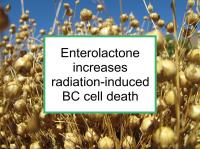Enterolactone is a type of phytoestrogen produced in the gut from lignans by intestinal microflora. Lignans are found primarily in the woody or fibrous tissues of a variety of plant foods, including seeds, whole grains, and some fruits and vegetables. Lignans have been found to have both estrogen-dependent and non-estrogen-dependent effects.
High circulating enterolactone levels have been linked to reduced risk of postmenopausal breast cancer. This association has been found for both hormone receptor positive (ER+/PR+) and hormone receptor negative (ER-/PR-) disease. High lignan consumption is also associated with significantly improved survival. Now a new study has reported that for the first time that enterolactone increases the sensitivity of breast cancer cells to radiation, thereby potentially enhancing the treatment effects of radiotherapy.
Latest research finds enterolactone sensitizes BC cells to radiation
The study referenced at the beginning of this news story was designed to investigate the impact of enterolactone on the treatment effects of radiation in breast cancer cells. To conduct the study, the authors studied the radiation response of enterolactone in both triple negative (ER-/PR-/HER2-) and ER+/PR+ cells and also investigated the corresponding cellular mechanisms. The cells were treated with enterolactone before being irradiated and radiosensitivity was evaluated. In addition, cell cycle effects, apoptosis (programmed cell death), and DNA damage and repair were measured.
Treatment with enterolactone was found to reduce the viability of breast cancer cells in a dose- and time-dependent manner. Enterolactone heightened the radiosensitivity of cells by interfering with the cell cycle, weakening DNA repair, and increasing radiation-induced programmed cell death. In addition, the authors detected greater chromosomal damage and abnormalities in cells treated with enterolactone plus radiation compared to radiation alone. These effects were more apparent in ER+/PR+ than in triple negative breast cancer cells.
The authors comment that this is the first study demonstrating that enterolactone is a radiosensitizer for breast cancer, irrespective of estrogen receptor status. Enterolactone appears to be a candidate for combined therapy with the potential to reduce radiation dose and attendant side effects, according to the authors.
Please see our article on what to eat during radiotherapy for more information.
